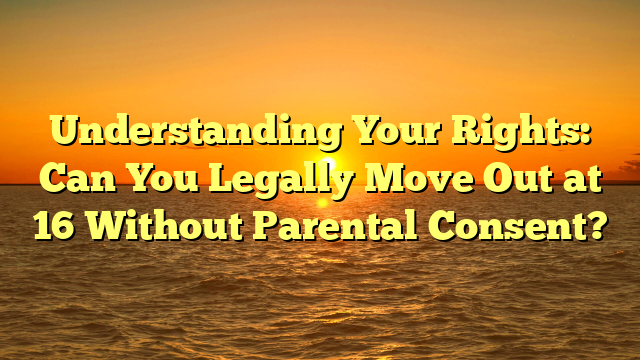Understanding Your Rights: Can You Legally Move Out at 16 Without Parental Consent?
Introduction
Turning 16 is a significant milestone in a teenager’s life. It often comes with a newfound sense of independence and a desire for more freedom. One question that may arise during this time is whether it is legally possible to move out of your parents’ home without their consent. In this article, we will explore the legal rights of 16-year-olds and the factors that determine whether they can legally move out without parental consent.
Legal Age of Majority
In most countries, including the United States, the legal age of majority is 18. This means that individuals under the age of 18 are considered minors and are subject to the legal authority of their parents or guardians. However, there are some exceptions to this rule.
Emancipation
Emancipation is a legal process that allows minors to become legally independent from their parents or guardians before reaching the age of majority. It grants them the rights and responsibilities of an adult, including the ability to make decisions about their living arrangements.
In order to be granted emancipation, a 16-year-old would typically need to demonstrate that they are capable of supporting themselves financially and managing their own affairs. They would also need to show that living with their parents or guardians is not in their best interest.
Marriage
In some jurisdictions, marriage can also be a pathway to legal independence for minors. If a 16-year-old gets married, they may be able to move out without parental consent. However, it is important to note that marriage at such a young age is uncommon and often subject to additional legal requirements and restrictions.
Factors to Consider
Even if a 16-year-old is legally able to move out without parental consent, there are several factors they should consider before making such a decision.
Financial Stability
Moving out at 16 often means taking on financial responsibilities that may be challenging for someone of that age. It is important to assess whether you have the means to support yourself, including paying for rent, utilities, groceries, and other living expenses.
Educational Considerations
Leaving home at 16 may have an impact on your education. Consider whether you will be able to continue attending school or pursuing your desired educational path if you move out. It is important to have a plan in place to ensure that your educational goals are not compromised.
Emotional Support
Living independently at such a young age can be emotionally challenging. It is important to have a support system in place, whether it be friends, family, or professionals, who can provide guidance and assistance during this transition.
Legal Consequences
It is crucial to understand that moving out at 16 without parental consent may have legal consequences. While emancipation or marriage may grant you certain rights, there may still be limitations and obligations that come with being a minor.
Child Protective Services
If you move out without parental consent and are deemed to be in an unsafe or unstable living situation, Child Protective Services may become involved. They have the authority to intervene and ensure your safety and well-being.
Legal Obligations
Even if you are legally independent, you may still have legal obligations as a minor. This includes attending school, following curfew laws, and abiding by other regulations that are specific to minors.
Conclusion
While it may be possible for a 16-year-old to legally move out without parental consent, it is important to carefully consider the implications and consequences of such a decision. Financial stability, educational considerations, and emotional support are all factors that should be taken into account. Additionally, understanding the legal obligations and potential involvement of Child Protective Services is crucial. If you are considering moving out at 16, it is advisable to seek legal advice and guidance to ensure that you are making an informed decision.
References
- Legal Age of Majority: https://www.law.cornell.edu/wex/age_of_majority
- Emancipation: https://www.law.cornell.edu/wex/emancipation_of_minors
- Child Protective Services: https://www.childwelfare.gov/topics/responding/reporting/how/
Table: Legal Age of Majority by Country
| Country | Legal Age of Majority |
|---|---|
| United States | 18 |
| United Kingdom | 18 |
| Canada | 18 |
| Australia | 18 |

